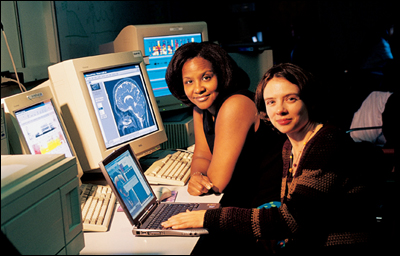 |

|
 |
Carol Espy-Wilson, at left, and Pamela Abshire. |
|
Associate Professor Pamela Abshire (ECE/ISR) and Professor Carol Espy-Wilson (ECE/ISR) have received funding from The University of Maryland's Maryland Industrial Partnerships Program (MIPS).
Abshire is partnering with the Rockville-based company Innovative Biosensors Inc. on a $235,596 grant to develop a hand-held diagnostic instrument for Group B Streptococcus, a type of bacteria that causes illness in newborn babies, pregnant women and the elderly. The device will enable rapid, automated detection for clinicians at the point of care.
Espy-Wilson is working with Baltimore-based Juxtopia LLC on a $168,960 grant to develop advanced speech enhancement software for Juxtopia's augmented reality products that need speech recognition to work in noisy environments.
The two projects are among 17 research collaborations in the 43rd round of MIPS awards. MIPS awards enable Maryland companies and university faculty to develop technology-based commercial products. Worth $4.8 million, the projects combine $3.4 million from participating companies and $1.4 million from MIPS and span the state. Funding supports research in the laboratories of participating faculty, who work closely with partner companies to advance their products. All funding goes to the project faculty and often supports the work of graduate students.
February 2, 2009
|

